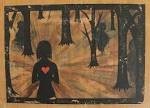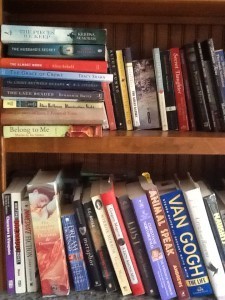Tracy Shawn's Blog, page 7
July 11, 2015
How Toastmasters can Replace Anxiety With Confidence!
by
Tracy Shawn, M.A. author of “The Grace of Crows“

This revised article was first Published By Tracy Shawn, M.A., Noozhawk Columnist, in Noozhawk.com on 06.25.2015 1:00 p.m. under the title: “How Toastmasters can Turn Fear Into Empowerment.”
If you suffer from the common — but debilitating — fear of public speaking, struggle with social anxiety and/or want to sharpen your communication and leadership skills, a visit to one of your local Toastmasters clubs can be an effective start toward a rewarding journey from fear to empowerment.
A nonprofit (and very affordable organization to join), Toastmasters International, which was established nearly a century ago, is built on group encouragement.
Their club mission statement summarizes the supportive atmosphere that Toastmasters clubs all around the world (according to the Toastmasters International website, there are 14,650 clubs in 126 countries) embrace: “We provide a supportive and positive learning experience in which members are empowered to develop communication and leadership skills, resulting in greater self-confidence and personal growth.”
The benefits members experience are both expected and surprising.
Pat Costello, a Realtor with Coldwell Banker who is an active Toastmasters member and is currently serving as president at her local club, says that besides the increasingly effective communication skills that she’s seen herself and others acquire, Toastmasters also has become a place where she’s been able to better hone her listening skills. She feels, too, that even though every member has most likely felt some level of discomfort, the supportive environment that a Toastmasters club provides helps people grow out of their fears, which then increases personal confidence.
Barc Holmes, the president and CEO of Deliverse Consulting, is a three-year member of Toastmasters. An engaging speaker, Holmes states that Toastmasters has not only improved his speech writing, but also has helped him learn how to connect in front of a crowd. He’s surprised with how the power of humor helps this connection, even in speeches with a serious message.
Holmes originally joined to overcome his fear of public speaking, and continues on with the organization in order to “learn how to write better in a way that moves people.”
A dedicated member for more than 16 years and past president of her local Toastmasters club, website and marketing consultant wiz Jacky Lopez says that Toastmasters is “the greatest organization I’ve joined since I came to this country.” Lopez states that beyond the empowering gift of learning that it’s OK to speak her mind, as well as giving her the opportunity to shed her fear of public speaking, Toastmasters has also proved to be a positive group experience in which she’s able to meet people from a variety of backgrounds and nationalities.
An active member (who has also served in the past as a president) with Woodland Toastmasters, Albert Mercado has been involved with the organization for 20 years. Mercado, a retired engineer and extraordinary storyteller, first joined because he wanted to improve his public speaking skills and feel comfortable in front of an audience. With time, he found that his presentation skills improved so tremendously that he was continuously selected to speak in front of customers and fellow employees. He was also pleasantly surprised to find that it became very enjoyable to appear in front of the public and speak.
A mentor and inspiration to members at his local club, Mercado says, “The hardest part is to make the decision to attend meetings, but once you go over that hurdle, you’ll enjoy the friendly atmosphere, the support you receive, and in a short time you’ll see the progress that you will be making. During my years at Toastmasters I have seen many very successful stories.”
When Holmes was asked what advice he’d offer someone contemplating on joining a Toastmasters club, he shared this: “Jump in, get nervous, screw up, laugh it off and keep going.”
This is the spirit of Toastmasters, where members know it’s OK to make mistakes because everyone is there to learn. In the supportive atmosphere that a Toastmasters club provides, fear can often blossom into empowerment through the simple but powerful act of practicing in a safe and friendly environment.
Tracy Shawn’s writing has appeared in literary journals as well as print and online newspapers and magazines. Her award-winning debut novel, “The Grace of Crows,” is about what happens when an anxiety-ridden woman reconnects with her childhood friend, Billy, now homeless and living under a pier in Malibu.
June 14, 2015
Take A Hike From Anxiety: How Self-Help Books can Help

Please Note: This is a revised piece from an earlier blog and was also published with online magazine Psych Central under the title “Walking Away From Anxiety & Fear”
Anxiety. The very word can make me feel tense, fretful, stressed. It pinches a personal nerve, as I have suffered from both chronic and acute varieties. (And I’m not just talking about the normal, everyday fare either: Mine has included quite over-the-top irrational fear, which makes watching end-of-the-world movies a relaxing respite). But I have fought my anxiety, an ongoing process that — for the most part — has been a journey of positive transformation.
I know I’m not alone. If you look at the statistics, anxiety disorders affect about 18% of U.S. adults, creating some 40 million tormented citizens. That makes a heck of a lot of people walking down the street, trying to push past their fear.
Some may turn to counseling, some to medication, and some may battle the angst with a combination of therapy and medication. Like so many things in life, what works for one person, may or may not work for the next.
I had tried all the above (including a host of herbal remedies), yet still had not been able to live a life without chronic and acute fear intruding into my daily thoughts and happiness.
So, on a sleepless summer night, I edged toward the TV as I listened to bright-eyed Lucinda Bassett, author of the best-selling book From Panic to Power, talk about how she was able to transcend her own fear and why she had started the Midwest Center, a well-respected program that treats people suffering from chronic stress, anxiety and depression. (Please note that there are a plethora of helpful books and programs available in a variety of price ranges, which may help you on your own personal journey through anxiety.)
By the hazy light of the screen, I scribbled down the number, and in the morning ordered their program. I listened to the tapes on a portable cassette player (yes, it was that long ago!), as I walked by myself on the beach or hiked alone on mountain trails. In doing so, I was better able to absorb and practice the ways to replace negative, fearful thoughts with more productive — and sane — self-talk.
I am happy to say that over time, with a lot of practice (and from the cathartic healing from my own writing), my overall anxiety has significantly decreased.
In the process, I also learned a poignant lesson: I wasn’t alone. I wasn’t the only person leading a normal life while battling the undertow of irrational fear. Somehow that fact alone helped me become even more hopeful and empowered.
If other people with thoughts just as scary as mine could climb out of their anxiety, then I could too. Yes, I still face some dark days. But it’s different than it used to be. Now I realize that no matter how bad things look, the dread won’t last.
Since anxiety can be isolating and is also an essentially a thick kind of worry about the future, knowing that I’m not alone — and that it will eventually fade away have become my best antidotes.
About Tracy Shawn, MA
Tracy Shawn lives and writes on the Central Coast of California. Her debut novel “The Grace of Crows” is about what happens after a woman with debilitating anxiety reconnects with a childhood friend who has become homeless and is living under a pier in Malibu.
April 21, 2015
How to Be True to Yourself
By Tracy Shawn, M.A., Noozhawk Columnist | First Published on 04.13.2015 3:50 p.m on Noozhawk.com under title: “How to be Your Own Best Friend”
Of course, it’s important to be a good friend to others, yet it’s also just as imperative (sometimes even more so) to be your own best friend.
In order to live a happier, more authentic life, it helps to practice respect, compassion and trust toward your own true self just as you would to a good friend. Yet these seemingly simple concepts are sometimes difficult to execute. Below are three reminders that can help you become an even better friend to that one person in your life who is constantly — and I do mean constantly — in it.
» 1. Maintain Self-Respect (And Be True to Thyself): Respecting yourself doesn’t just mean making choices that protect your health and psychological well-being such as maintaining a reasonably healthy diet and keeping good company; it also means that you acknowledge who you really are. For example, if one of your greatest passions is art, make sure to “etch” out the time in which to enjoy it. If you’re not a professional artist, you can still take classes, visit museums and even practice some quick sketching when the muse beckons.
Likewise, acknowledge what doesn’t make you happy. If you get overwhelmed by being around a lot of people for extended periods of time, don’t judge yourself, but rather appreciate this part of who you are and make sure to schedule time to be alone. Remember that respecting yourself means that you take care of both your physical health — and your emotional happiness.
» 2. Practice Self-Compassion: If one of your friends came to you crying about how devastated she felt about being fired from her job, you wouldn’t push her into a deeper depression by listing all the reasons she might have brought it upon herself and how difficult it will be to find another position. Yet, too many people would engage in this self-loathing talk if it happened in their own lives. Remember, then, to recognize the negative, self-destructive ways in which you “speak” to yourself, and then consciously engage in the kind of positive, constructive self-talk that can help move you forward. An easy way to do this is to ask yourself what compassionate things you’d say to your dearest friend if she needed to feel motivated and understood.
» 3. Learn How to Trust Yourself: Experts agree that the most valued attribute of what constitutes a true friend is trust. We trust that our most beloved friends will be there in times of crisis, as well as rejoice with us in times of triumph. We trust that they wish the best for us — as we wish the best for them. We trust that they will like us, even with all our imperfections, as we continue to like them.
In order to learn how to trust yourself more, you must treat yourself as you would your truest friends. When facing a crisis, make sure to take care of yourself by heeding the same advice, as well as seeking help from the same resources you’d recommend to others. When something wonderful happens, make sure to acknowledge your hard work and celebrate your achievements. Remember, too, to make sure that you show yourself how you continue to wish the best for yourself by persisting to take steps in which to attain your goals.
And last, but certainly not least, remember to accept yourself! Just like your dearest friends, you’ll continue to make mistakes, exhibit annoying quirks and struggle with issues. And just as you steadfastly stand by the side of your truest friends, you can also learn to truly trust and like yourself as the very best friend who will help you lead a more joyful and meaningful life.
— Tracy Shawn, M.A., lives and writes on the Central Coast of California. Her award-winning debut novel, The Grace of Crows, is about how an anxiety-ridden woman finds happiness through the most unexpected of ways — and characters.
February 26, 2015
Very Inspiring Blogger Award
By
Tracy Shawn, M.A.
Thank you very much to Michelle Robin La for nominating me for the “Very Inspiring Blogger Award.” This award allows bloggers to share other websites they feel are relevant. I’m honored to be nominated by Michelle Robin La, the author of the fascinating, “Catching Shrimp with Bare Hands: A Boy from the Mekong Delta,” the true story of a boy growing up in the midst of the Vietnam War and his struggle for freedom after the Communist takeover. Michelle’s website includes engaging blogs about the culture and history of Vietnam: http://www.michellerobinla.com/.
Here are the guidelines for accepting the award and nominating other bloggers:
Thank the person who nominated you and add his or her link to your blog.
List the award rules so your nominee/nominees will know what to do.
State seven things about yourself.
Nominate other blogger/bloggers.
Contact your nominees and provide a link to your post.
Display the award logo on your blog, whether on your sidebar or about page, or special award page.
Seven Things You Might not Know About Me:
I absolutely love cloudy days!
I have several comfort foods, including lox, bagel, and cream cheese (lots of cream cheese, please!), popcorn, and Chinese food.
I drive a used car, which is a stick shift, and it makes me happy when I can zoom ahead of expensive, high-end cars (safely, of course!).
Although I’m naturally shy, I love talking to strangers and getting to know their stories.
I was really hesitant to get on any kind of social media, but I was pleasantly surprised by how much I love Twitter!
I cry and laugh way more easily than the average person.
I like to be by myself and get stressed out if I’m not able to have some time to myself every day (thank goodness I’m a writer!).
Blogger I Nominate for Making the Internet a Better Place:
I nominate Charles Friedo Frize for Very Inspiring Blogger Award because he shares relevant topics such as marketing trends, social media branding, and digital marketing, with the intent to help others succeed. His work is always well written, well researched, and positive. Charles is a marketing genius with a heart! http://www.internetbusinessideas-viralmarketing.com/viral-marketing-blog.html.
February 22, 2015
Why Invite an Author to Your Book Club?

Photo by Tracy Shawn
By Tracy Shawn, M.A., Noozhawk Columnist | First Published on 02.06.2015 3:41 p.m. in Noozhawk.com
If you are in a book club, you’re definitely not alone. According to a New York Times article by James Atlas (March), an estimated 5 million Americans meet every few weeks to share impressions from their latest read.
Atlas notes that book clubs allow readers to share the emotional experience of entering a book’s story. When you read a book, you perceive it in your own way — but when you share the difference of perceptions, it raises your understanding even more. And when you invite a guest author, your book club can engage on an even deeper level.
Amy Goetsch, one of the organizers of the Thousand Oaks Book Club (which has 11 book groups, with 244 members), states that they are anticipating their first local author visit in July. She feels that the benefits of hosting a guest author include “Inside information concerning character development, plot, and why an author chooses to go in a certain direction.” Goetsch wants to support local authors, and feels that inviting them helps further embrace the spirit of the book club community.
Santa Barbara novelist, songwriter and teacher (an instructor at Santa Barbara Writers Conference since 2001) Monte Schulz (published novels include Naughty, The Big Town, The Last Rose of Summer, This Side of Jordan and Down By the River — with an upcoming novel that will be published in three parts by Fantagraphics based on his previous writings on the Jazz Age), feels that book clubs can gain significant insight into how books are conceived by asking guest authors why they chose a particular subject matter.
Schulz’s favorite questions include which authors influenced his own style, as well as why he chose a certain setting and historical period. The answers, Schulz feels, helps readers dive further into the story by providing them with an author’s explanation of how he or she renders fictional family history within the storyline.
If you decide to invite a local author as a guest speaker, Goetsch suggests that the organizer should read the book before setting up the author talk to make sure it’s a good fit for the group.
“Not everyone likes every book,” she said, “but I wouldn’t want the author to be bombarded by negative comments. I would want some supportive, encouraging remarks and general interest in the book.”
Once the date is set, Goetsch states that members should, of course, read the book before the meeting and come up with some discussion questions before they attend.
Schulz is in agreement. As an author who was invited to one book club that actually had quite a passionate disagreement with two members who hadn’t even read his book — but who felt the need to criticize it — Schulz notes that book clubs should choose novels everyone will agree to read, and that it helps when members come in with prepared questions.
Whether a book club decides to invite a local author, who can visit in person, or enjoy either a phone or Skype appearance with a writer (you can usually find the contact information on an author’s website or check out sites such as Reader’s Circle or Galley Cat for info on authors available for guest/phone/Skype visits), a more spirited and enriching meeting is likely to occur.
As Goetsch stated in her interview: “I always feel an author wants to leave us with something … a thought or even a feeling that will change us in some way.”
— Tracy Shawn, M.A., lives and writes on the Central Coast of California. Her award-winning debut novel, The Grace of Crows, is about how an anxiety-ridden woman finds happiness through the most unexpected of ways — and characters. Dubbed a “stunning debut novel” by top 50 Hall of Fame reviewer Grady Harp, The Grace of Crows has also been hailed as an accurate portrayal of generalized anxiety disorder and a healing opportunity to the readers. Click here for more information about Shawn, or click here to visit her author page on Facebook. Follow her on Twitter: @TracyShawn. The opinions expressed are her own.
February 5, 2015
Shorty Award Nominee Speech for #Author Category by @TracyShawn
Why Fiction is Important
By
Tracy Shawn, M.A.
Why is fiction important? The great mythologist Joseph Campbell explains that stories give us relevance and meaning to our every day lives. A recent study at Emory university also concluded that reading a novel creates neural changes, which helps readers transport into the body of the protagonist, encouraging personal growth, compassion, and even courage.
As a storyteller, I take this responsibility very seriously. This is why I hope to be considered for a social media award for author category with the Shorty Awards. I am passionate about my craft. I write 365 days a year and am proud that my debut novel, “The Grace of Crows,” about a woman’s journey from anxiety after reconnecting with a childhood friend who has become homeless, has won three different literary awards.
Since “The Grace of Crows” was traditionally published by a small press, I was told to use social media to reach out to potential readers who would not otherwise hear about it. I have to admit that I was reluctant. Yet, interestingly, I have found that social media—especially Twitter—helps me in ways that go beyond mere self-promotion. I am able to connect with people on a global scale who face similar struggles, fears, and hopes.
These connections inspire me to keep writing. Whether I’m working on a novel, short story, or article, my intent is to produce work that will not only entertain, but to also help readers realize that they are not alone.
To quote the great American author James Baldwin, “You think your pain and your heartbreak are unprecedented in the history of the world, but then you read. It was books that taught me that the things that tormented me most were the very things that connected me with all the people who were alive, or who had ever been alive.”
If I am lucky enough to win in the category of author with Shorty Awards, I believe it’ll help me to connect with even more readers, who I hope will enjoy my stories and embark further into the inner-world of their own hero journeys.
Tracy Shawn, M.A. lives and writes on the Central Coast of California. Her award-winning novel, The Grace of Crows , is about how an anxiety-ridden woman finds happiness through the most unexpected of ways—and characters. If you’d like to vote for Tracy in the #author category with the Shorty Awards, please visit : http://shortyawards.com/TracyShawn
January 28, 2015
What Should Aging Gracefully Really Mean?
By Tracy Shawn, M.A., Noozhawk Columnist |
|First Published on 01.15.2015 5:25 p.m. on Noozhawk.com
When I was growing up, I often overheard my mother debating with her friends about if certain movie stars were aging gracefully. These discussions were solely focused on if these famous women’s looks were holding up or not. Never once did these verbal dissections connect the aging gracefully phrase to a woman’s accomplishments, goals or happiness.
Now that I am in the middle-age woman zone, I look back and wonder if things have changed that much — or have they gotten worse?
Yes, of course, us women mentor each other in all kinds of wonderful ways and we respect famous women and our own female family, friends and neighbors who have worked hard to achieve their goals, and more importantly, are great examples of kind, thoughtful people.
Yet — and this is a big YET — the pressure for women to stay as young looking as possible seems to be even greater now than ever before. Back in my mother’s day, facelifts were merely the stuff of movie star lore (or the rare old lady in Beverly Hills who braved a nip and tuck). More importantly, the aging process for the average woman was not only expected, but OK. Getting a bit softer and wrinkly after a certain age was never considered to be some kind of social transgression. But now! Now, it seems as if women left and right of me are getting injected, lifted and liposuctioned as if it were their civic duties.
I realize that women in certain careers — especially ones in the entertainment industry — have always had a lot more pressure than the rest of us. I also understand that if a woman thinks that it’ll make her feel better about herself to invest in some “work,” it’s her prerogative. I say more power to her if that’s really what she wants. Hell, I wouldn’t mind snapping my fingers to magically erase some of my deeper worry lines and lift my sagging neck!
The question, though, is when do we stop buying into this cultural obsession that continually shames us into thinking how staying youthful looking should be a priority?
Whatever the emotional and physical effects these anti-aging procedures have on both the individual and for all of us collectively, this is what I want to say: Aging gracefully shouldn’t be about signing up to be a warrior in the battle to stay looking young. If we live a certain number of years, we will get old. (Except, of course, Jane Fonda, but the rest of us mortals definitely will!)
So what should aging gracefully really mean? In a word: wisdom. This is the kind of wisdom that tells us not to buy into the dysfunctional cultural system that tells us to look a certain way. And, yes, we still know it’s OK to keep healthy — and happy — by employing a sane exercise routine and a generally healthy (but still enjoyable) diet. If there’s some — or a lot of — saggy, bulgy, wrinkly parts we wish were as pert and firm as when we were in our 20s, our grace is being able to hone our humor and acceptance skills like never before. There are far more important things for us to contend with and concentrate on than to fuss so much about looking younger.
And what is important in the long run? Definitely not our looks. Rather it’s recognizing what we’ve learned so far from living a life of both triumph and regret and how we can share that deeper knowledge, empathy and love with others.
— Tracy Shawn, M.A., lives and writes on the Central Coast of California. Her award-winning debut novel, The Grace of Crows, is about how an anxiety-ridden woman finds happiness through the most unexpected of ways — and characters. Dubbed a “stunning debut novel” by top 50 Hall of Fame reviewer Grady Harp, The Grace of Crows has also been hailed as an accurate portrayal of generalized anxiety disorder and a healing opportunity to the readers. Click here for more information about Shawn, or click here to visit her author page on Facebook. Follow her on Twitter: @TracyShawn. The opinions expressed are her own.
December 10, 2014
Holiday Survival When Anxious or Depressed

By TRACY SHAWN, MA (This article was first published in PsychCentral.com)
For those of us who suffer from anxiety or depression, the holiday season can prove especially challenging. The juxtaposition of unhappy thoughts alongside the cheery Christmas music, nostalgic movies dripping with holiday sentimentality, and advertisements displaying jubilant people celebrating the season can make us feel even worse.
The American Psychological Association lists financial concerns, unrealistic expectations, and the inability to be with certain family members and friends as contributing factors to holiday anxiety. Mix in the stressors of shopping, family reunions, travel, office parties, and dealing with houseguests, and no wonder this seasonal “cheer” can be a land mine.
Below are five tips on how to navigate the holiday season when you are also dealing with ongoing anxiety and depression:
1. Acknowledge your feelings. According to the Mayo Clinic article on stress management, one of the first steps in dealing with holiday stress is to express your true feelings. If you need to, take time out to cry or share your feelings with a trusted family member or friend. Remember that you cannot force yourself to be happy just because it’s the holiday season. It’s okay to feel and express what is going on inside of you.
2. Keep your schedule sane. The Anxiety and Depression Association of America suggests that it’s a helpful idea not to overschedule during the holidays. Remember that you can control the seasonal overload instead of letting it control you. You do not have to attend every function, and when you do, it may help to arrive late and leave early. And if some traditions cause you more stress and unhappiness than joy, consider changing them or even letting them go altogether.
3. Maintain realistic expectations. Remember that no one has the perfect family, so toss out the unrealistic wishes and expectations that whatever family function you attend will be as pumpkin-pie sweet as that Hallmark movie you’ve just watched. Instead, realize that, yes, you will probably have to deal with some of the same old family dynamics that push your buttons. Remember that this isn’t the time to air past resentments. Stay calm, change the subject, and then steer clear. You can always wait to sort through your feelings over the phone with an understanding friend after you get home, or even to the blissfully nonjudgmental ear of your dog or cat.
4. Focus on healthy habits. Although the holiday season can throw us off schedule, it’s important to maintain healthy habits. Engaging in regular physical and mental wellness routines such as jogging, yoga, spiritual practices and long walks can calm one’s mind and provide a better prospective on what’s really important. Also, think twice about overindulging in alcohol. Overdrinking has been shown to exacerbate both depression and anxiety.
5. Create a comfort zone. This one is a personal favorite that I have practiced for many years. I have discovered that if I consciously plan a calming activity after a stressful social event, it helps me feel a lot less anxious both during and after that event. So, think about something soothing that you can look forward to immediately after coming back from social functions that may leave you feeling drained. It helps that much more to know that when your in-laws guilt-trip you about not visiting enough, you can picture yourself in just an hour or two lounging on your couch and watching a comedy or snuggling under the covers and reading a great book.
Tracy Shawn, M.A. lives and writes on the Central Coast of California. Her award-winning novel “The Grace of Crows” is about how an anxiety-ridden woman finds happiness through the most unexpected of ways—and characters. Dubbed a “stunning debut novel” by top 50 Hall of Fame reviewer, Grady Harp, The Grace of Crows has won the Jack Eadon Award for the Best Book in Contemporary Drama, Second Place for General Fiction for the Readers Choice Awards, and Runner-Up for 2014 General Fiction with the Great Northwest Book Festival.
November 6, 2014
3 Ways to Increase Hope and Motivation
by
Tracy Shawn, M.A.
First Published in ExpertClick.com under title: “Three Ways to Keep Your Hope Alive (And Your Work Productivity High)
“If we were logical, the future would be bleak indeed. But we are more than logical. We are human beings, and we have faith, and we have hope and we can work.” ~~Jacques Cousteau
Have you ever experienced a period in your life where your concentration and productivity dipped well below the usual flow? Where most of your mental energy went into worrying about what is going to go wrong instead of right?
Then you get some good news and all of a sudden your vitality is restored and so too is your work output. Research has shown that hope is a powerful motivator. In fact one study (as noted by Patricia A. Dunavold in her analysis, “Happiness, Hope, and Optimism” for California State University, Northridge) has shown that hope was a better predictor of first trimester grades than student’s SAT scores.
The question is: How does one continue to keep his or her hope up?
Given both the external realities of our world, plus the very real struggles we all have to face in our personal lives, it can be quite easy for hope to dry up. Factor in the emotional and physiological components of depression and anxiety that many of us also experience, and hope starts to look as lifeless as the dead grass in an ongoing drought.
The good news, though, is that you can create your own nourishment to renew both hope and inspiration. Below are three easy—and positive—steps to keep your hope alive:
1. Practice Humor
According to an article in Science Daily, research at Texas A&M University shows that humor can positively influence a person’s state of hopefulness. As part of the study, participants who viewed a 15-minute comedy video experienced statistically significant increases in their hopefulness scores after watching it as compared to those who did not. Psychologist David H. Rosen concludes that humor is a positive emotion that helps people pursue more creative paths of thought and action, and therefore helps people feel as if they can more easily overcome obstacles—which, of course, is a large component of hope.
2. Create a Game Plan
Another aspect of hope, according to Rosen, is tied to a person’s ability in developing a “plan of attack.” So when you are facing a specific problem, you can increase your hope levels by creating a game plan. By writing down all the steps you can take, as well as preparing a “plan B” (and perhaps even a “plan C” as well!), you are consciously taking control of your life, and at the same time helping to increase your hope.
3. Call Upon Your Cognitive Skills
Dunavold states that many studies have demonstrated that the right cognitive strategies can help restore and maintain hope. Practicing such cognitive behaviors as positive self-talk, envisioning hopeful outcomes, reading uplifting books, and listening to upbeat music are all practices that help people to keep their hope up through adverse life events. In conclusion, hope is a large component to not only our happiness, but also our motivation. Focus on nourishing it—and it will nourish you back!
“You are not alone…please know that hope can fly in on the most unexpected of wings.” ~~quote from novel “The Grace of Crows”
Tracy Shawn, M.A. lives and writes on the Central Coast of California. Her award-winning novel, The Grace of Crows , is about how an anxiety-ridden woman finds happiness through the most unexpected of ways—and characters. Dubbed a “stunning debut novel” by top 50 Hall of Fame reviewer, Grady Harp, The Grace of Crows has won the Jack Eadon Award for the Best Book in Contemporary Drama, Second Place for General Fiction for the Readers Choice Awards, and Runner-Up for 2014 General Fiction with the Great Northwest Book Festival.
October 13, 2014
A Simple Guideline on How to Write an Amazon Book Review (And Why it Matters!)
by
Tracy Shawn, M.A.
If you’d like to help your favorite authors get the word out for their books, writing a positive review on Amazon is a wonderful—and fun—way to help. The more reviews a book receives, the more likelihood that it may be recommended to other potential readers.
Oftentimes, well-established authors receive hundreds of reader reviews on their books, whereas unknown—or should we say—little-known authors oftentimes receive less than a handful of scattered reader recommendations.
Regardless if an author’s work has made it the best-seller list or is languishing on the sidelines, if there are any books—especially ones that may not have a large marketing plan through a major publisher—that you have enjoyed reading, and feel deserve the recognition, please consider writing a review on Amazon.
If you’ve never written one, it’s quite easy. Here’s how:
Log into your Amazon account.
Search the book you’d like to review and then click onto that book’s title.
Scroll all the way down until you see: “Write a Customer Review” (it’s the grey rectangle you’ll click on, which is near the bottom of the first page—past product, editorial, and the most helpful customer reviews).
Click on the stars (clicking four stars means you like a book and five stars means you loved it).
Enter the title for your review in the title bar.
Type your review in the space provided.
Submit!
(this article was first published in ExpertClick.com)
This author thanks you for taking the time to read this and hopes your reading journey takes you on many thought-provoking adventures!
With Warm Wishes,
Tracy Shawn
Tracy Shawn, M.A. lives and writes on the Central Coast of California. Her award-winning novel, The Grace of Crows , is about how an anxiety-ridden woman finds happiness through the most unexpected of ways—and characters. Dubbed a “stunning debut novel” by top 50 Hall of Fame reviewer, Grady Harp, The Grace of Crows has won the Jack Eadon Award for the Best Book in Contemporary Drama, Second Place for General Fiction for the Readers Choice Awards, and Runner-Up for 2014 General Fiction with the Great Northwest Book Festival.








